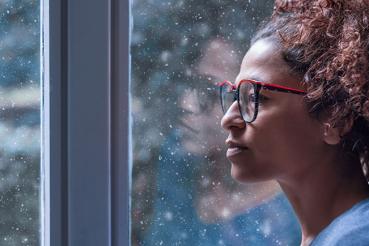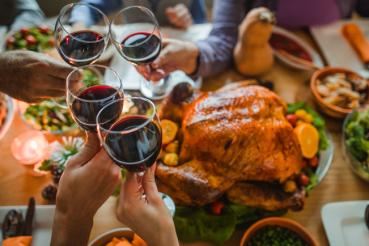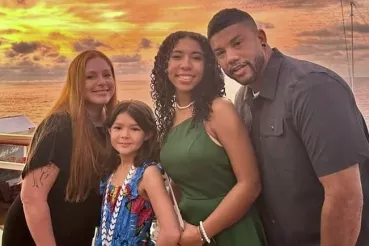It’s officially cuffing season — the time of year when couples cozy up with each other and singles look for short-term relationships to get through the chilly months.
However, this last year hasn’t been the easiest to date and be intimate, particularly with those whom we’re not sheltering in place with, and has put a strain on the majority of our relationships.
So, how do we create and maintain connections with others?
Rush Oak Park Hospital primary care physician Kimberly Harden, MD, and Rush University Medical Center manager of social work services and patient navigation for Affirm: The Center for Gender, Sexuality and Reproductive Health Matthew Vail, MA, discuss ways to date and be intimate with others — and whether you should — during the era of COVID-19.
Longing connections
Sheltering in place and social distancing have contributed to many of us experiencing the psychological effects of social isolation, such as depression and anxiety, among other challenges.
“Without the ability to socialize, our entire social rhythm can be thrown off. This includes when we wake up, go to sleep and eat, and how often we bathe, shower or wash our clothes,” Vail says.
And it’s clear that people are seeking connections — especially young adults. A national survey examining the sexual behavior of young adults in the U.S. during the beginning of the pandemic found that 53% of the participants in Chicago broke quarantine to have a sexual encounter.
“The urge to socialize and be intimate is not going to change anytime soon,” Harden says. “But it’s about making those connections as safe as possible.”
Assessing the risk
Assessing the risk is essential when considering if you want to date in person and be intimate during COVID-19. Higher-risk date activities include indoor dining, and situations where you are not able to be socially distant or you have your mask off for an extended period of time.
“It used to be that dinner and a movie was a casual date,” Harden says. “Now dinner and a movie is a really big deal because of the risk that comes with it.”
She adds that intimacy is considered close contact, and that even a single kiss increases the risk of transmission.
“Everything people want to do is a little risky right now,” Harden says. “The safest thing that you can do if you are going to be close to someone is a hug with a mask on. However, the risk goes up the closer you are physically and the longer you spend time in each other's personal space.”
If you’re having in-person dates or being intimate with someone you’re not living with, Harden recommends both partners test negative for the virus and quarantine, as well as research the transmission rates in each other’s areas before meeting.
Consent expanded
Traditionally, the concept of consent has initiated conversations about partners’ sexual histories, among other topics. However, during a pandemic, there is more to discuss when it comes to safely dating and being intimate.
“Be sure to talk with your partner about both of your ideas of personal safety in regards to mask wearing, social distancing or dating other people,” Vail says. “This can be a tricky conversation, especially if you have differing views, but it’s important to respect each other’s wishes.”
Vail also encourages you to receive verbal consent from your partner before engaging in any kind of physical contact, even holding hands or hugging.
Being transparent about personal safety during the pandemic is key, no matter the living situation with your significant other.
The vaccine and dating
With broader access to a vaccine on the horizon, naturally, more of us will want to date and be intimate. However, it’s important to stay vigilant.
“Everyone is not going to get vaccinated at the same time,” Harden says. “And since both the Pfizer and Moderna vaccines are given in a two-dose series, people will only be partially vaccinated until they get their booster shot.”
She emphasizes that we should not change our safety habits anytime soon, even if you or your partner, or both of you, have been vaccinated.
“We should not let our guards down just because vaccines are available,” she says. “We still need to wear a mask, social distance and practice good hand hygiene during this vaccination period to keep ourselves, our partners and our communities safe.”
Building safe connections
Navigating dating and intimacy safely this year has required us to be creative. Both experts recommend using virtual platforms for building connections with others during this time.
In fact, 65% of singles who participated in a survey said video chatting made them like their date more, and 59% reported that they had more meaningful conversations during their video chat.
Here are other tips to making connections safely during COVID-19:
- Maintain alternative forms of contact. Engage in virtual activities, such as simultaneously watching the same TV show or movie, playing a game together online, or each preparing the same recipe in your own kitchen.
- Take advantage of online or app dating. Most dating websites and apps are free for you to chat and meet new people.
- If you do meet in person, choose a location where you can be socially distant. Depending on the weather, try to plan a date outdoors, such as a picnic, meal, hike or walk, and have at least 6 feet of distance between you. If you both have dogs, suggest a dog-walking date so your dogs can have some social interaction, too.
- When being intimate, wear a mask. Regardless of the level of contact, be sure to wear a mask. This will help prevent the potential spread of respiratory droplets that contain COVID-19.
- Maintain your distance and other safety precautions. Although difficult, try to wear a mask and keep your distance from your partner throughout your entire date. And be vigilant about hand hygiene, especially if you do hold hands.





